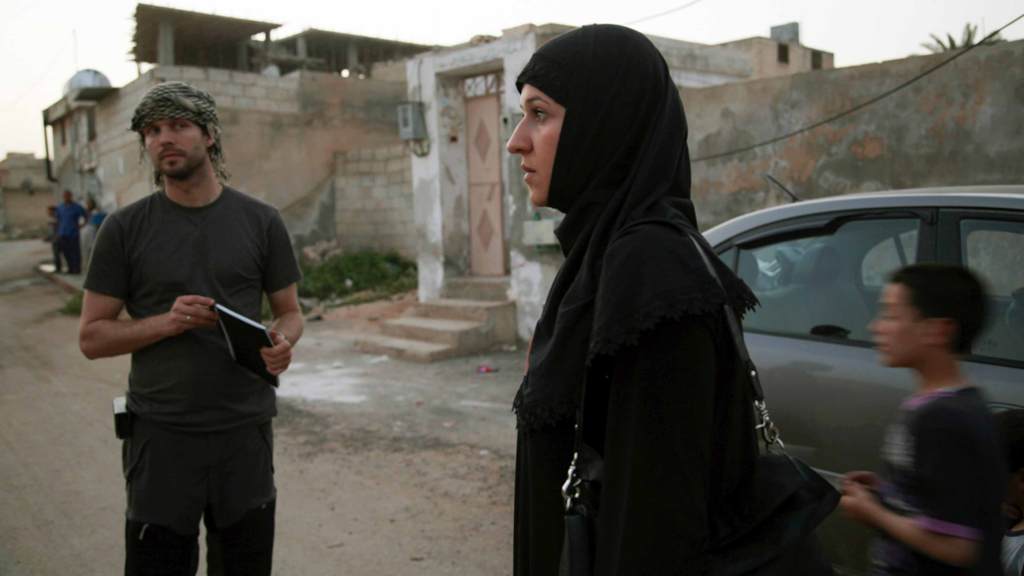
The members of Human Rights Watch’s Emergencies Team (or E-Team) risk their lives to document war crimes and report them to the rest of the world. They’re on the ground as soon as possible after reports of human rights abuse surface, working to uncover evidence about the truth of what happened. E-Team, a documentary supported by JustFilms and directed by Ross Kauffman and Katy Chevigny, follows four members of the team as they piece together events in various troubled spots around the globe. The film offers an intimate look at these committed, courageous human rights workers, and brings fresh urgency to the ongoing struggle for justice around the world.
Shortly before a screening at the foundation, Louis Bickford, program officer for Strengthening Human Rights Worldwide, discussed Ford’s long term support for Human Rights Watch and the organization’s place in the broader picture of human rights activism and advocacy.
The foundation has supported Human Rights Watch for years. What continues to make their work so important, and how is that reflected in the film?
Human Rights Watch is a highly effective, very focused organization with a clear role: to hold perpetrating entities accountable for crimes that they commit, and then to use that leverage to stop abuses and prevent further crimes. Their work is classic human rights advocacy; it’s actually what people typically think of when they think about human rights activism.
What the E-Team does is very exciting, and it works well on film: There are bombs falling on Syria, and human rights workers are on the ground trying to figure out if people are being gassed, if chemical agents are being used and where the weapons were deployed. And they’re using very sophisticated methodologies to figure those things out.
The film gives a sense of what the organization does through the lens of some of its more dynamic and physically dangerous work. But it also shows that the E-Team isn’t always on dangerous assignments: They’re following up with research, doing a lot of interviews, tracking down archival material and working with journalists and colleagues to dig up more information. That research and support work is much less glamorous, but just as important.
Your initiative supports many other organizations whose approach is quite different from Human Rights Watch. What’s the relationship between them?
Human rights work today involves a lot more than just naming and shaming. We support organizations that are working to improve policies, defend human rights defenders, make connections with other players like multinational corporations and environmental movements.
A lot of Human Rights Watch’s work is immediate: people are being killed and tortured, and they intervene. But there are a lot of groups out there that don’t have the same kind of visibility. Those groups are figuring out how to develop long-term strategies to prevent torture, build democratic institutions, strengthen policy frameworks and freedom of expression—to build long-term infrastructure to help prevent rights abuses from happening in the first place. So, Human Rights Watch is part of an ecosystem.
What are some of those efforts your initiative is supporting around the world?
De Justicia is focused on transitional justice and building a long-term peace in Colombia. They’re sitting down with the government and paramilitaries and trying to figure out strategies for peace that will benefit the country in the immediate to long term. In Brazil, Conectas is focusing on how that country can play a role on the global stage. For example, as a state, can Brazil play a role in helping to stop a conflict in the Central African Republic? They want to make sure Brazil and other countries are at the table in a way that’s constructive and helps to lead to peace. Legal Resources Center in South Africa is working to develop a global conversation about the right to education.
These are just some of many different groups we support that are doing really great, unsung work. I hope “E-TEAM” can be a starting point for larger conversations about that work, and will get people interested in the broader ecosystem.
The film spends a lot of time with the central characters, when they’re in middle of investigations and also on their days off. Do you think that will also help viewers understand the importance of the issues the E-Team works on?
The members of the E-Team are like superheroes in some ways—they’re brave, they put themselves in dangerous situations, they work really hard. They’re rigorous. They’re also real people with real lives. The filmmakers follow them back to their apartments and we see their dirty dishes; we see them trying to write serious reports at their dining room tables.
I think this film is going to make some percentage of people who see it, especially younger people, want to be human rights activists. And it’s going to inspire respect and maybe some awe for what those activists do. That’s important—we want this work to be recognized and celebrated.
Watch a short clip from E-Team:
Accessibility Statement
- All videos produced by the Ford Foundation since 2020 include captions and downloadable transcripts. For videos where visuals require additional understanding, we offer audio-described versions.
- We are continuing to make videos produced prior to 2020 accessible.
- Videos from third-party sources (those not produced by the Ford Foundation) may not have captions, accessible transcripts, or audio descriptions.
- To improve accessibility beyond our site, we’ve created a free video accessibility WordPress plug-in.
